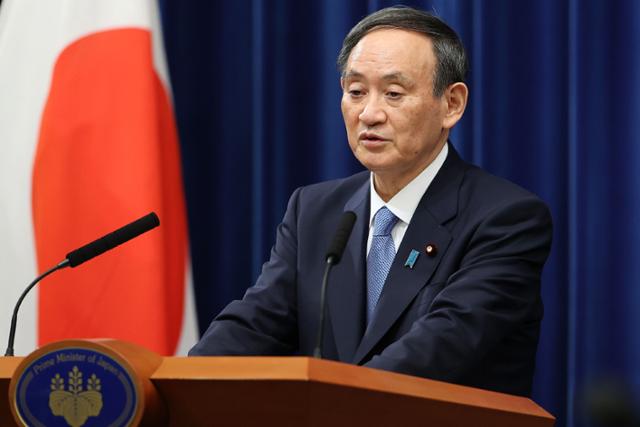
Japanese Prime Minister Yoshihide Suga said at a New Year’s press conference held at the Prime Minister’s residence in Tokyo on the 4th that he is considering the issuance of an emergency declaration in the metropolitan area in relation to countermeasures against the novel coronavirus infection. Tokyo = AFP Yonhap News
Japanese Prime Minister Yoshihide Suga announced at a New Year’s press conference on the 4th that it is considering issuing an emergency declaration in the metropolitan area, including Tokyo, in connection with the rapid spread of the novel coronavirus infection (Corona 19). Accordingly, the Kyodo News Agency reported that an emergency situation will be issued for a month from 0 o’clock on the 9th. However, on the 2nd, the head of four metropolitan areas (1st and 3rd prefectures), including Tokyo governor Koike Yuriko and the governor of Kanagawa, Chiba, and Saitama, requested the government to issue an emergency. It became a form of acceptance as if it was pushed back. With the prudent attitude of Prime Minister Suga, who has hesitated to respond preemptively over fear of adverse economic effects, the public opinion environment is worsening.
“Many people infected in the metropolitan area… Need a strong message

While the spread of novel coronavirus infection has not stopped, the grounds of Kanda Myojin Shrine in downtown Tokyo are crowded with worshipers. Tokyo=EPA Yonhap News
At the New Year’s conference held at the Prime Minister’s residence, Prime Minister Suga formalized his intention to review the emergency declaration based on the Special Measures Act. “The number of infected people in the metropolitan area is very high,” he explained, and “we decided that there was a need for a stronger message.” On the 31st of last month, the number of new confirmed cases in Tokyo was 1,337, surpassing the 1,000 level for the first time, and in the whole country, it recorded 3,000 people in six consecutive days as of the previous day (3rd).
When the emergency declaration is issued, it is the second time since April-May last year. Last year, restrictions were imposed on overall social and economic activities across the country, but this time, based on the past case, only limited measures are expected to be taken in the metropolitan area. Prime Minister Suga added, “After learning for a year, it became clear where the problem was. In that respect, limited and intensive implementation is effective.” Since the majority of infections of unknown origin are due to food (eating and drinking), it is expected to focus on reducing restaurant business hours. On the 2nd, the government asked the heads of the metropolitan area to shorten the restaurant’s business hours from 10 pm to 8 pm.
Regarding the vaccination, Prime Minister Suga emphasized that “the vaccination can be started by the end of February as much as possible.” In the first half of the year, the Japanese government secured the amount of vaccination (approximately 28,000 doses) for the whole country (about 127 million people). In addition, in order to prevent the spread of mutations originating abroad, such as the UK, it has announced that it will stop’business traffic’ to countries with confirmed mutations. Japan is an exception to the deregulation of entry to 11 countries, including Korea and China, and exemption from quarantine for two weeks for short-term business travelers. However, it is highly likely that Korea, where the infected person of the COVID-19 mutation has been confirmed, will be excluded from the target country. Regarding the holding of the Tokyo Olympics, he said, “We will realize it as evidence that humanity has won Corona 19.”
Request for closure in case of emergency, limit without force

Tokyo Metropolitan Governor Yuriko Koike (right) and the heads of metropolitan areas, including Tokyo Governor, announced on the 2nd in Tokyo that they requested the government to issue an emergency declaration at a press conference after meeting with Economic Regeneration Minister Yastoshi Nishimura (left) in Tokyo. Tokyo = AFP Yonhap News
When an emergency declaration is issued, the head of the local municipality may issue an order to close school or request a reduction or suspension of business hours for public facilities such as restaurants, department stores, movie theaters, and performance halls. Last year, a number of large corporations started working from home, and department stores and concert halls closed all at once. However, due to the lack of enforcement measures such as penalties under the current law, it is limited to rely on the voluntary participation of citizens.
Accordingly, the government is planning to deal with a bill that includes penalties for business operators if they do not comply with requests for suspension of business during the regular National Assembly convened from the 18th. In this regard, while there are opinions that compulsory measures are inevitable to control infection, there are many concerns that the constitution may limit the rights of citizens. Prime Minister Suga announced on the day that “we will submit a bill of revision of the Special Measures Act to the National Assembly in order to take more effective measures by combining benefits (government compensation) and penalties.”
Although Prime Minister Suga has made a sudden transition to’review for the announcement’, criticisms of the’rear-North Korea response’ continue, and criticism of the defensive attitude at the conference is also erupting. It took less than 30 minutes to read the interview and answer questions. When a reporter asked about the issue of diplomatic affairs while addressing the Hong Kong issue and asking, “Isn’t the Japanese government unable to properly say what to say to China?”
Tokyo= Kim Hoe-kyung Correspondent [email protected]
You can also view the news Naver Et edited by the Hankook Ilbo.

